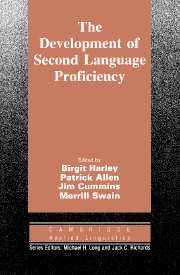Book contents
- Frontmatter
- Contents
- List of contributors
- Series editors' preface
- Acknowledgments
- Introduction
- I THE NATURE OF LANGUAGE PROFICIENCY
- II CLASSROOM TREATMENT
- III SOCIAL AND INDIVIDUAL VARIABLES
- IV PRACTICAL AND POLICY IMPLICATIONS
- V THIRTY-FIVE YEARS OF RESEARCH ON BILINGUALISM
- Chapter 16 Persistent issues in bilingualism
- CONCLUSION
- References
- Author Index
- Subject Index
Chapter 16 - Persistent issues in bilingualism
Published online by Cambridge University Press: 05 October 2012
- Frontmatter
- Contents
- List of contributors
- Series editors' preface
- Acknowledgments
- Introduction
- I THE NATURE OF LANGUAGE PROFICIENCY
- II CLASSROOM TREATMENT
- III SOCIAL AND INDIVIDUAL VARIABLES
- IV PRACTICAL AND POLICY IMPLICATIONS
- V THIRTY-FIVE YEARS OF RESEARCH ON BILINGUALISM
- Chapter 16 Persistent issues in bilingualism
- CONCLUSION
- References
- Author Index
- Subject Index
Summary
One of my purposes here is to explain to outsiders (those who are not in the research field itself) as well as to insiders (those of us who have the luxury of contemplating, researching, and theorizing about the topic) why and how some of us have focused on the topic of bilingualism over a number of years. This topic, in fact, has grown into a recognized and respected research specialty during the past thirty-five years. It has also become a vibrant, exciting new specialty of study. Consequently, a second purpose I have in mind is to provide a small sample of what it is that makes it exciting. My third purpose is to demonstrate as well as I can that the study of bilingualism is a serious, real-world matter, much more than an academic exercise. The tie-in with the real world means that we insiders have had to extend ourselves through self-education in current political and sociological ways of thinking. This is so because bilingualism is inextricably linked with such basic concepts as personal identity, culture and ethnicity, biculturalism and, on a national level, multiculturalism.
Most outsiders know a good deal about bilingualism because so many people in North America are bilingual to some extent, and because most are cognizant of the juggling act immigrants have to perfect in order not to lose one or the other of their precious linguistic and cultural heritages.
- Type
- Chapter
- Information
- The Development of Second Language Proficiency , pp. 201 - 218Publisher: Cambridge University PressPrint publication year: 1990
- 22
- Cited by



